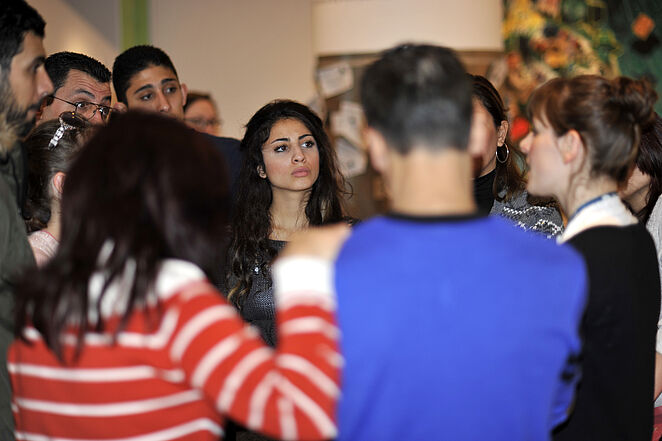Multaka: Treffpunkt Museum
Ein Kooperationsprojekt zwischen dem Museum für Islamische Kunst, dem Vorderasiatischen Museum, der Skulpturensammlung und Museum für Byzantinische Kunst und dem Deutschen Historischen Museum.

یکشنبه ها ساعت 4 بعدازظهر، تور رایگان به فارسی و عربی!
مولتاکا، به معنی نقطهتلاقی و یا محل دیدار، با هدف تبدیل کردن موزه به محلی برای دور هم جمع شدن و شکل دادن گفتوگوهای بینافرهنگی به وجود آمد. هدف مولتاکا علاوه بر این، تقویت مشارکت فرهنگی افرادی با سابقهی مهاجرت(اجباری) است.
این پروژه در سال ۲۰۱۵ توسط موزهی هنرهای اسلامی و با همکاری موزهی بوده، موزهی خاور نزدیک و موزهی تاریخی آلمان شکل گرفت. مولتاکا (یا محل دیدار) با جمع کردن افراد و برگزاری تور، سعی دارد ارتباط دورههای مختلف تاریخی، و مکان های قدیمی و جدید را به مخاطبان نشان دهد.
این پروژه با به رسمیت شناختن پیشینهی فرهنگی و زبانی مخاطبان، به کمک راهنمایان فارسی و عرب زبان و با هدف بازپس گیری فضاهای فرهنگی -که تا قبل از این برای بسیاری از مخاطبان غیرقابل دسترس بودند- به ایجاد تغییر و تنوع بخشیدن به نهادهای فرهنگی متفاوت کمک می کند و امکان همکاری سازنده و قابل اعتماد مخاطبین با نهادهای فرهنگی را فراهم می کند. در مجموع، بیش از ۳۰ راهنما در مولتاکا در برلین آموزش دیدند، که از آن تعداد ۱۶ نفر از راهنماها هنوز به طور فعال در این پروژه مشارکت دارند.
________
Free of charge tours in Arabic and Farsi every Sunday at 4 pm!
Multaka: Meetingpoint Museum was initiated by the Museum of Islamic Art in 2015, in cooperation with the Museum of Islamic Art, The Ancient Near East Museum, the Bode Museum and the German Historical Museum.
As part of the project people with (forced) migration from Syria and Iraq, and then later on (in 2020) from Afghanistan and Iran, were trained as museum guides so they could lead interactive museum tours for other diaspora members in their native language.
Multaka (Arabic for „meeting point“) stands for the exchange of different cultural and historical experiences. The guided tours transfer questions about historical objects to current debates in order to establish a relationship between the past and the present. Furthermore, the guides involve the participants in the process of viewing and interpreting the objects. Through the mutual dialogue and taking into account their own history, the visitors become active participants.
Through low-threshold approach and peer-to-peer communication Multaka intends to create an open space in which museums become – literally – a meeting point and to achieve an active cultural participation through the long term diversification of the museums’ structures.
________
Kostenfreie Führungen auf Arabisch und Farsi immer sonntags um 16.00 Uhr
Multaka: Treffpunkt Museum wurde 2015 vom Museum für Islamische Kunst initiiert, in Kooperation mit dem Vorderasiatischen Museum, dem Bode-Museum und dem Deutschen Historischen Museum.
Im Rahmen des Projekts wurden Menschen mit (erzwungener) Migrationserfahrung aus Syrien und dem Irak, später (2020) auch aus Afghanistan und dem Iran, zu Museums-Guides ausgebildet, damit diese interaktive Führungen für andere Angehörige der Diaspora in ihrer Muttersprache durchführen können.
„Multaka” (arabisch: Treffpunkt) steht dabei für den Austausch verschiedener kultureller und historischer Erfahrungen. Die Führungen übertragen Fragestellungen zu historischen Objekten auf aktuelle Debatten, um einen Bezug zwischen Vergangenheit und Gegenwart herzustellen. Dabei beziehen die Guides die Besuchenden in den Prozess der Objektbetrachtung und dessen Interpretation mit ein. Durch den wechselseitigen Dialog und unter Berücksichtigung ihrer eigenen Geschichte werden die Besucher*innen zu aktiven Teilnehmenden.
Durch niedrigschwellige Ansprache und Peer-to-Peer-Kommunikation beabsichtigt Multaka Räume für Begegnungen zu schaffen, indem Museen – wortwörtlich – zu einem Treffpunkt werden und mit der aktiven kulturellen Partizipation zu einer dauerhaften Diversifizierung der Museumsstrukturen beizutragen.
Gefördert von
"Alwaleed Philanthropies (AP) supports and initiates projects around the world, regardless of gender, race or religion. AP collaborates with a range of philanthropic, government and educational organizations to combat poverty, empower women and the youth, develop communities, provide disaster relief and create cultural understanding through education. With its partners, it aims to build bridges for a more compassionate, tolerant and accepting world."
